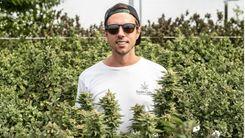Associations may have more space in the debate on the regulation of cannabis cultivation in Brazil
Entrepreneur Fabrício Penafiel considers the inclusion of practical experience of producers in the proposal, with a deadline set for September 30th, a historic opportunity.
Published on 08/18/2025

Representatives of the Ministry of Agriculture, Livestock, and Supply (MAPA) informed Sechat Portal that new meetings with these entities are expected to take place until the final proposal is delivered. Image: Canva Pro
The regulation of national cannabis cultivation for therapeutic use in Brazil, scheduled for September 30, 2025, may gain strength with the active participation of sector associations. Associations confirmed to Sechat's editorial team that the Ministry of Agriculture, Livestock, and Supply (MAPA) will hold new meetings with these entities until the final proposal is delivered.
For the co-founder and Marketing Director of Bem Bolado Brasil, Fabrício Penafiel, this is the moment to "join forces" and take advantage of the government's momentum. He argues that associations and self-cultivators — already familiar with the cultivation conditions in the country — should be heard and valued, as they have technical knowledge about climate, seeds, extraction, and national production.
History of dialogue with the sector
Contacts between the government and associations are not new. On July 24, the Minister of Agriculture, Carlos Fávaro, met with Deputy Eduardo Suplicy and representatives of the Flor da Vida Association to discuss advancements in the regulation of cannabis cultivation for therapeutic use.
According to Fávaro, the ministry is in favor of the agenda and works together with Anvisa, the Ministry of Finance, and the Ministry of Justice to finalize the proposal. "The government will deliver a regulation that improves the lives of thousands of Brazilians," said the minister, in a publication by the Flor da Vida Association.
He also emphasized that all cultivation that generates income and employment for small, medium, and large producers will be supported by MAPA, highlighting the economic importance for the rural scenario.
Ordinance paves the way for seed imports
Shortly after the meeting, Ordinance SDA/MAPA No. 1,342 was published, which establishes phytosanitary requirements for the import of Cannabis sativa seeds, regardless of origin.
The regulation is part of the Federal Government's Action Plan to regulate hemp cultivation in Brazil.
For Fabrício Penafiel, the opening of this official dialogue marks a strategic moment. "Now that things are going to start working, more than ever the sector needs to come together and demand rights," he said during the 4th Brazilian Medicinal Cannabis Congress.
He emphasizes that those who already cultivate in the country have essential practical experience for the construction of an efficient regulation.
Follow the interview:
New Anvisa rules impact the sector
In the regulatory field, the National Health Surveillance Agency (Anvisa) published, on July 29, RDC No. 982, which establishes new guidelines for granting and renewing Good Manufacturing Practices Certificates (CBPF) and Good Distribution and Storage Practices Certificates (CBPDA).
The measure directly affects companies that work with cannabis-based products, as well as pharmaceutical inputs, medicines, biological products, and medical devices.
With the new RDC, Anvisa will be able to define the most appropriate evaluation method — on-site inspection, documentary analysis, or recognition of reports from an equivalent foreign regulatory authority (AREE) — and combine them according to the risk level.
Agenda postponed, but within the deadline
Despite the progress, the proposal for new rules for the cultivation of varieties with low tetrahydrocannabinol (THC) content was not analyzed at the 12th meeting of the Collegiate Board (Dicol), held on August 13.
The topic, listed as item 2.8, could change the classification of varieties with up to 0.3% THC, currently prohibited, allowing their cultivation under strict control conditions.
Nevertheless, Anvisa informed Sechat Portal that the actions planned in the agenda will be completed on time, and the vote should take place before September 30.









